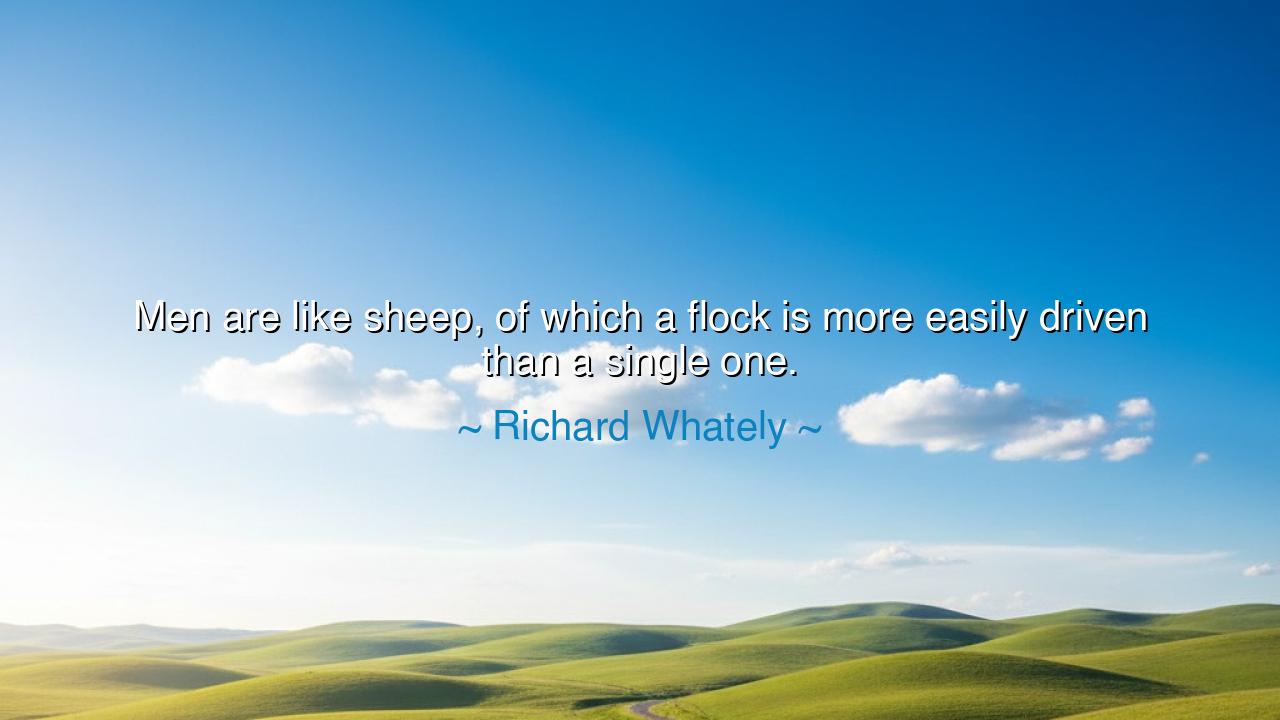
Men are like sheep, of which a flock is more easily driven than a






Hearken, O seeker of wisdom, to the words of the ancients, and ponder well the saying of Richard Whately: “Men are like sheep, of which a flock is more easily driven than a single one.” In these words lies a mirror of human nature, unveiled with both sorrow and power. For though man is fashioned with reason and will, he is oftentimes swayed by the voice of the multitude, forgetting the strength of his own soul. As sheep turn not by their own discernment, but by the motion of the herd, so too does mankind bend under the weight of the crowd, following not the path of truth but the path of ease.
Behold how the multitude, when gathered in a flock, can be led with but a single gesture or word. Alone, one sheep might resist, standing its ground. But when encompassed by the press of its fellows, it yields without thought, carried along like a leaf upon the stream. Thus it is with men. One man alone may question, may challenge, may pause to consider—but when surrounded by the voices of many, his spirit trembles, and he follows for fear of standing apart. This is the ancient weakness of humanity: the longing for belonging, even when the cost is truth.
History, eternal teacher, offers countless examples of this truth. Recall the fall of Rome into tyranny. The Roman Senate, once the guardian of freedom, became swayed by the shouts of mobs in the Forum, and by the orchestrated spectacles of emperors. The people, craving bread and circuses, surrendered their liberty for the fleeting comfort of spectacle. Alone, a Roman might have risen in protest, but in the flock, they clamored as one voice, demanding their own chains. The empire, mighty though it seemed, was driven like sheep toward its decline.
Consider also the tale of the noble philosopher Socrates. When he stood before the assembly of Athens, accused of corrupting the youth, the many cried out against him. Few paused to weigh the justice of his words, though his reasoning was like a blade cutting through the fog of error. Yet the flock, stirred by envy and fear, condemned him to drink the poison. Here the wisdom of one man was silenced by the blindness of the many, proving the very force Whately described: the flock is more easily swayed than the solitary.
Yet, let not thy heart despair. For though the flock may be driven, the strength of the one who resists is like a flame in darkness. Think of Rosa Parks, a woman of humble birth, who refused to surrender her seat on a bus in Montgomery. The flock around her submitted to unjust laws, bowing to the driver’s commands. But she, like the lone sheep who does not flee, stood firm. From her courage arose a movement that transformed a nation. Thus we see: though the many may be driven, the steadfastness of one soul may awaken others to stand beside them.
Therefore, O listener, take this teaching into thy heart: do not be as the unthinking sheep, swayed only by the multitude. Train thy mind to question, to pause, to seek the voice of truth even when it is faint and solitary. Let courage be thy shepherd, and discernment thy staff. For the path of wisdom is not always the path of the crowd. Better to walk alone in righteousness than to march with the multitude into error.
Practical is this counsel: when thou findest thyself surrounded by the voices of the many, pause before thou movest. Ask thyself, “Do I follow because it is right, or because it is easy?” Learn to read, to ponder, to weigh both history and conscience. Speak gently, yet firmly, when the crowd clamors for folly. And when thou findest another soul who dares to stand apart, join them, that two may stand against ten, and ten against a hundred. For a small flame may kindle a great fire, and a lone sheep that resists may turn the flock toward freedom.
Thus remember always: men are like sheep, but thou need not be so. Choose instead to be the shepherd of thy own soul, and perhaps, by thy courage, the shepherd of others. The wisdom of Whately is both a warning and a call: guard thy spirit against the pull of the multitude, and let thy heart be steadfast, for the fate of many may depend upon the strength of one.






AAdministratorAdministrator
Welcome, honored guests. Please leave a comment, we will respond soon